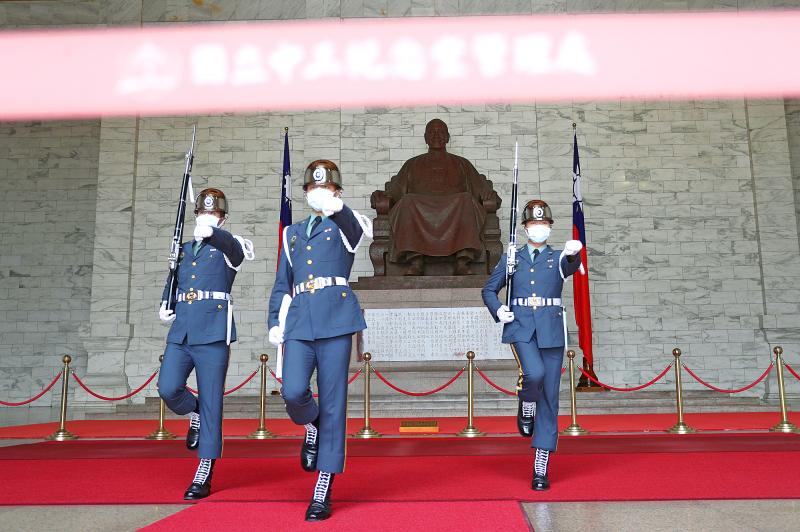Efforts must be made to remove the statues of former president Chiang Kai-shek (蔣介石) and stop the worship of a dictator responsible for the deaths of many Taiwanese, a group of White Terror era victims said yesterday.
The group opposed a proposal to place an iron cage over Chiang’s bronze statue at Taipei’s Chiang Kai-shek Memorial Hall.
The Transitional Justice Commission should push ahead with its plan to take down the 6.3m statue and move it to the Cihu Mausoleum in Taoyuan’s Dasi District (大溪), former political prisoner Tsai Kuan-yu (蔡寬裕) said.

Photo: CNA
“This has been enshrined in law, so the government must remove all symbols of authoritarianism that are still in place,” said Tsai, the honorary chairman of the Taiwan Association for the Care of the Victims of Political Persecution During the Martial Law Period.
Tsai, now in his 80s, was targeted by the KMT’s persecution of dissidents and civil liberty advocates. He was imprisoned twice from the 1960s to the 1970s, spending a total of 13 years in prison.
Article 5 of the Act on Promoting Transitional Justice (促進轉型正義條例), passed by the legislature in 2017, stipulates that “symbols appearing in public buildings or places that commemorate or express nostalgia for authoritarian rulers shall be removed, renamed, or dealt with in some other way,” Tsai said.
“We have pressed the demand to remake Chiang Kai-shek Memorial Hall as part of the transitional justice process and get rid of the statue. Such a move has basis in the law and therefore should be implemented soon, but we only see inaction and more delays,” he said.
Several consultation meetings were held over the past two months with officials from the Ministry of Culture department that manages the memorial hall, and several rounds of discussions were held with commission officials, Tsai said.
“Our organization and other groups representing the victims of past political persecution have voiced their recommendations. We also spoke directly with the current and former minister of culture,” Tsai added.
“They have our recommendations and should take action to implement them... It is painful to see Taiwan undergoing democratization for three decades and people still having a personality cult for the worship of a dictator,” he said.
Only when the statue is removed from the memorial hall can the nation close this chapter of its history, Tsai said.
“If not, the malevolence of the past authoritarian regime and the personality cult will remain alive, and our society will waste time squabbling over it year after year,” he said.
Regarding the proposal to place an iron cage on the statue, Tsai said: “We disagree with such ways to cast aspersion on the statue... The best way is to remove it, without leaving a trace, which should end all disputes over the issue.”
Meanwhile, the Taiwan 228 Care Association has launched a petition to terminate all government funding for ceremonial activities at the memorial hall, and to have Chiang’s descendants pay for the statue’s care.

The Executive Yuan yesterday announced that registration for a one-time universal NT$10,000 cash handout to help people in Taiwan survive US tariffs and inflation would start on Nov. 5, with payouts available as early as Nov. 12. Who is eligible for the handout? Registered Taiwanese nationals are eligible, including those born in Taiwan before April 30 next year with a birth certificate. Non-registered nationals with residence permits, foreign permanent residents and foreign spouses of Taiwanese citizens with residence permits also qualify for the handouts. For people who meet the eligibility requirements, but passed away between yesterday and April 30 next year, surviving family members

The German city of Hamburg on Oct. 14 named a bridge “Kaohsiung-Brucke” after the Taiwanese city of Kaohsiung. The footbridge, formerly known as F566, is to the east of the Speicherstadt, the world’s largest warehouse district, and connects the Dar-es-Salaam-Platz to the Brooktorpromenade near the Port of Hamburg on the Elbe River. Timo Fischer, a Free Democratic Party member of the Hamburg-Mitte District Assembly, in May last year proposed the name change with support from members of the Social Democratic Party and the Christian Democratic Union. Kaohsiung and Hamburg in 1999 inked a sister city agreement, but despite more than a quarter-century of

Taiwanese officials are courting podcasters and influencers aligned with US President Donald Trump as they grow more worried the US leader could undermine Taiwanese interests in talks with China, people familiar with the matter said. Trump has said Taiwan would likely be on the agenda when he is expected to meet Chinese President Xi Jinping (習近平) next week in a bid to resolve persistent trade tensions. China has asked the White House to officially declare it “opposes” Taiwanese independence, Bloomberg reported last month, a concession that would mark a major diplomatic win for Beijing. President William Lai (賴清德) and his top officials

‘ONE CHINA’: A statement that Berlin decides its own China policy did not seem to sit well with Beijing, which offered only one meeting with the German official German Minister for Foreign Affairs Johann Wadephul’s trip to China has been canceled, a spokesperson for his ministry said yesterday, amid rising tensions between the two nations, including over Taiwan. Wadephul had planned to address Chinese curbs on rare earths during his visit, but his comments about Berlin deciding on the “design” of its “one China” policy ahead of the trip appear to have rankled China. Asked about Wadephul’s comments, Chinese Ministry of Foreign Affairs spokesman Guo Jiakun (郭嘉昆) said the “one China principle” has “no room for any self-definition.” In the interview published on Thursday, Wadephul said he would urge China to